

Although Barks was only known to the public for about 30 years, he was frequently asked to comment on many different subjects. Now the man did have strong opinions on such subjects as the environment, politics, and the general state of affairs but he seldom shared his views, partly because of the interviewers' lack of interest in that side of him, and partly because Barks realized that his strong opinions might alienate members of his audience. But he was always willing to talk about the work that made him famous. Below are gathered just a few of his many comments (ending with some of the more snappish ones).
NB.: A few of the quotes have been translated from foreign languages (Danish for one) and a translation may not be exactly what Barks originally said in English, but hopefully it will capture the meaning of the original quotation...
THE CHARACTERS
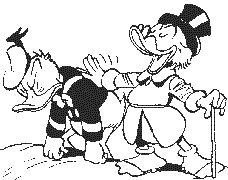 |
Whenever I needed a character, I would create one that apparently had been around but just hadn't been used yet. The way I presented these characters was the way they were in my head: they had been there all the time. On Donald: I broadened his character out very much. Instead of making just a quarrelsome little guy out of him, I made a sympathetic character. He was sometimes a villain, and he was often a real good guy and at all times he was just a blundering person like the average human being, and I think that is one of the reasons people like the duck. I've always looked upon the Ducks as caricature human beings. I would say that Donald should be my favorite character and I guess he is. Because he was the means in getting to Uncle Scrooge and all these others. But Uncle Scrooge is a good character and I am proud that I was able to invent him and I am also proud of some other characters that I invented, for example Gyro Gearloose, the crazy inventor. The variations you see in the duck's appearance over the years are due to trying to keep him looking like the screen duck, whose appearance changed radically. Donald's a lot like a lot of us... wanting to speak his mind. There isn't a person in the United States who couldn't identify with Donald. He is everything, he is everybody; he makes the same mistakes that we all make. He was sometimes a villain, and he was often a real good guy and at all times he was just a blundering person like the average human being, and I think that is one of the reasons people like the duck. I even tried to tone down the malicious streak in Donald's character. Why turn off millions of readers? It was okay for the Ducks from time to time, provided there were reasons for it, like the bump on his head in The Firebug. On Uncle Scrooge: I was beginning to find it hard to find something new for Donald to do. Suddenly I had another character on whom I could keep expanding for several years. I did not show Donald having ducks in his backyard or shooting ducks or anything in which a real live natural duck would be in the same story with him. Whenever I invented a villain, he was a stinking villain. He even looked it. All those pig-faced villains, and all those guys were mean all the way through. The Money Bin was probably built in the early 1920s. Little
Helper was originally just meant to be a fill-in
character who would live up the 'dull' panels in which
Gyro was just inventing and talking to himself. But Barks
slowly developed the little stickman to take a more
prominent attitude. He later stated: In 1994,
Barks was asked who would inherit Scrooge's money: The fact that Scrooge was rich was the thing that triggered all further developments as to just how rich, and the showing of his wealth. I found that was quite a fascinating subject - just piles of money would appeal to a lot of people - and I gradually made him richer and richer. Then I had to develop a place where he could store the money. I never collected coins. Nor did I collect stamps or whisky bottles or comic books. Just thinking up troubles that could beset Uncle Scrooge because of his coin collection scared me into a lifestyle of financial fritterbugging. Scrooge has the problem of trying to save what he has earned and what has come to him by hook and crook. He's gotten himself a nice comfortable spot where he's wealthy and secure, and he wants to preserve that. How was
Scrooge able to dive into his hard metal money without
getting hurt?: Donald is my favorite character, because he's like all my friends, my neighbors, myself - he's just Mister Everyman. One of the greatest difficulties in handling characters is in figuring out how each character is going to react to a certain situation. In that respect, Uncle Scrooge is fairly easy to keep in line. He will always choose the cheapest way to meet an emergency. |
|
THE STORIES
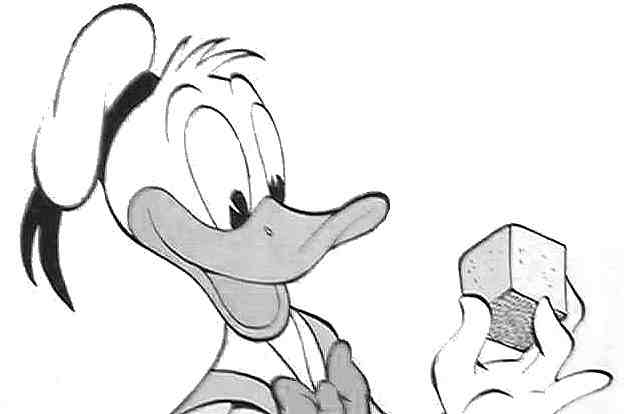 |
Of all the 500 stories I wrote, there was about 10 of them that started with suggestions from someone else. I always tried to write a story in such a manner that I wouldn't mind buying it myself. I know that I was expected to write for an audience of 12-year olds. But my faith in the 12-year old's intelligence was greater than the publisher's. In my opinion the kids should have relevant experience for their 10-cent. When struggling for a story, I would often ask myself: what locale do I want to draw? Do I want to draw a forest, the sea with sailboats, or would it be down in the mines and caves? As soon as I thought of a locale, I could come up with a reason for putting characters in that locale. I also knew that I was not to glorify crime. I could have the Beagle Boys always stealing, but I tried to do it in a very comical way. It had to be a fantastic kind of crime that a child could not imitate. It wasn't genius or even unusual talent that made the stories good, it was patience and a large wastebasket. I often liked to put the ducks into situations where they could be at sea. There is something romantic about harbors and sunken ships that appeals to all kids. I was letting the story build up to a certain point in which the reader would be expecting the conventional end, and then I would fool the reader by dragging in something that was completely ridiculous, making it look plausible. I read some of my stories recently and thought, 'How in the hell did I get away with that? I enjoyed doing the gag covers better than the story ones because they were usually simpler. A cover based on an incident in the plot took a great deal of staging to tell a little story that was still part of the book. And it had to make sense on its own. Once in a while the little kids would get themselves in some pretty bad messes and then Donald would have a chance to rescue them. But mostly it was Donald who got clobbered and the kids who rescued him. It worked out better, and it appealed to more people that way, because the readers were kids themselves. They liked to feel a little bit superior to the uncle who was strutting around. I told it like it is. I told my readers that the bad guys have a little of good in them, and the good guys have a lot of bad in them. Nothing is always going to turn out roses. I made them into smart little guys once in a while, and very clumsy little guys at other times, and always, I aimed at a surprise in each story so that nobody could pick up a comic book and say, 'Well, the nephews are going to behave thus and so.' They simply wouldn't know until they had read the story, just what those little guys were going to be up to... In fact I laid it right on the line. There was no difference between my characters and the life my readers were going to have to face. When the Ducks went out in the desert, so did Joe Blow down the street with his kids. When Donald got buffeted around, I tried to put it over in such a way that kids would see it could happen to them. Unlike the superhero comics, my comics had parallels in human experience. I believe that as time goes by people will realize those paintings I've done are all based on stories. If they don't know the story, the painting will be kind of meaningless, and so I believe the stories will be the thing that lives on into posterity. In 1994
Barks was asked if he would like to make another story: My first feature-length story starring the old miser was written to clarify who Uncle Scrooge really was, why he was what he was, and what desperate things he would do to keep on being that way. |
|
THE WORK
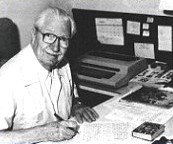 |
Working
indoors, out of the hot sun and the cold, and doing the
things I liked... why, that was half of my wages. I didn't
need a hell of a lot of money to make me happy. I was a loner, working in a small town far from any contacts with other comic bookers. I only work when I feel like it - but that is most of the time. From the time I can remember, I was trying to draw. First I'd draw with some charcoal that I'd pick up off the hearth, and write on the walls of the little shack we lived in. I like details in my paintings. I use the smallest brush to emphasize the smallest details. That's why I don't use canvass as much as masonite which has a very smooth surface. If more of my readers grow up to sit in the Senate chamber than to sit in the gas chamber, I'll have been richly rewarded for trying to turn out a good product. Getting new ideas was the big nerve-racker. Often I'd feel I'd pumped the well dry and hadn't another idea in my system: I'd get real scared. I can remember times when I got so scared that when I did come up with an idea, I almost cried with relief at having gotten over that hump again. When I got my plot all broken down into eight-panel pages and the whole thing written out and sprinkled with gags, the real pleasure came - sitting down to draw. I would read my storyboard over and over again. Not only that, I would read the script probably ten or twenty times before I ever started drawing it. Then, I'd go over the storyboard up on the wall probably another ten times before I ever got around to inking it. It becomes quite tiresome to paint all that money. But it is something that I know I can do if I just have the time. I can just sit and paint those coins by the thousands, year after year. It is becoming hard for me to paint because my hand is shaky, but these coloured pencils, I can do those because you have to bear down so hard on those pencils to get the pigment to come off on the paper that the shaking of my hand is all taken care of because it's just ground into the surface of the paper there where it can't shake. I worked hard, and I was lucky enough to have enough inspiration that I didn't have to produce myself, but it would just produce itself. I was able to do these things a lot easier than if I had had to do it all with heavy thinking. So much of the stuff just came as a gift to me. If I went two or three days without coming up with an idea I could begin to panic. I did get to thinking, 'My God, the well's gone dry and I can't come up with another idea to save my life'. But somehow, somewhere in that state of panic, why my brain would start working. When I think of the hundreds of stories I wrote, the hundreds of painting ideas, magazine covers, all of those gags that I've done in my lifetime, it's amazing that I ever did them. I used my eraser more than I used my pencils. Before I
started drawing a comic, I would read my script for it
ten or twenty times. Then, when I made my drawings, I'd
put up a page - that was eight panels - and alongside it
another eight panels. I would put about eight pages on
one of those big storyboards, pin them up there with push
pins. Then I could analyze whether I had carried some
sequences too far or whether I needed to add a little bit
of guts somewhere else. Barks was once asked how he planned the composition of his paintings: Behind every situation is a good idea. In general, I use key situations from my old comic stories. I start by producing many, many sketches in different perspectives. Usually I have to make four or five layouts before I have one that I like. I then transfer the ducks to transparent paper and pushes them around on the layout until they are at the right spot. In that manner the layout develops piece by piece. When
asked if he was not disappointed that Disney's withdrew
his special - and quite unique - permission to paint the
ducks in 1976, Barks answered: What was Barks' secret? Just hard, drudging work, he once commented. It happened from time to time that Barks needed a special facial expression for his ducks, and he would then sit in front of a mirror and try to simulate the expression. But I always ended up with a headache, he later explained. In a 1975
interview, Barks was asked if he would have liked to
include more sexuality in his work: I finally decided to do a watercolor to show that I'm really a hairy-chinned rebel at heart. Some of the main people who influenced my drawing style were Winsor McCay, Frederick Opper, and Hal Foster. Roy Crane, who drew Buzz Sawyer, also had a direct, simple style. Errors and boo-boos bother me years after I've forgotten every other feature of a story. I polished and polished on the scripts and drawings until I had done the best I could in the time available. If you were a prima donna down at the Disney studio, if you went in thinking you were a genius and then you had to work with a bunch of geniuses - why you soon got the ego knocked out of you. I visualized stories in plot sequences. Writing stories is a lot like writing poetry. It all has to be set to a certain tempo. Everything has to be in its right place at the right time. My drawings almost never looked as well staged or technically executed as I had pictured them in my imagination. |
|
THE ADVICE
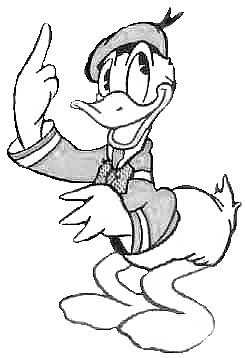 |
Don't try to use too many
ideas in a story plot. You have to be selective. Be mean.
Throw perfectly lovely gags in the waste basket. Ideas generally come in a very complicated form, and you've got to strip them down to make them useable. Boil a gag down to its simplest form and it is readily discernible to anybody who sees it. |
THE PERSON
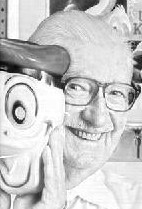 |
I always felt myself to
be an unlucky person like Donald, who is a victim of so
many circumstances. I would like to be remembered as a person who did a good job. I avoided politics because it is a very uninteresting subject to young kids. My own political philosophy is that we've got a pretty good thing going, and we should just leave it damn well alone. I was never a Boy Scout, but oh, I wanted to be one when I was a kid about ten or eleven years old. But there wasn't anyplace where I could ever join the Boy Scouts. I always got good grades in school except in English. I just found it hard to analyze a sentence. I am longing for the day when I can retire from the grinding deadline pressures of cartooning, and open up a little cabinet shop where I can work with my hands to create things from wood. I wouldn't have amounted to a hill of beans if I hadn't gotten into those comic books. Recognition is fine if the rewards are high enough to repay me for loss of privacy and freedom of expression. I have no cartoonists in my ancestral tree whatsoever, no artists that I know of, no writers that I know of. I was just sort of a mutant that came along. Casual remark from
1981: I was a fizzle as a cowboy, a logger, a printing press feeder, a steelworker, a carpenter, an animator, a chicken grower, and a barfly. Perhaps that all helped in writing my stories of the ineptitudes of poor old Donald. Remark
from the acceptance speech for the Disney Legend trophy
in 1991: |
THE COLLEAGUES
|
When
you look at my stories in the comic books you'll see that
I was trying to follow in the format that Gottfredson
established, having Mickey and the other guys involved in
funny situations at the same time as they were having
serious problems. And [then] they solved their problems
by funny means. You could draw just so much violent action in a comic book before it began to get tiresome. I think Floyd Gottfredson put his finger on it one time when I was talking to him, sometime in the nineteen-forties. I'd gone to the studio for something. He said, 'In the strip, the reader can hold it up, and he looks at it for a long, long time, but when it's on the screen, he sees it for a twenty-fourth of a second, and it's gone.' There's no chance for him to look at it too long. I remembered what he had told me, and I toned down my action a little bit after having talked with him. Most of my successful paintings have been painted with the colours that look as if Rembrandt had painted them. I remember Walt Disney as a genius. All of us respected and feared him. The only time I would ever see Walt was on the story conferences, when he'd come in and look at our stories that we had on our storyboards. He would always let us argue a story point. He'd even let us have the last word in these arguments. We said 'Yes, Walt'. Just think of all the good things Disney did for me. And so I feel that anytime I can do something in the way of drawing, signing of lithographs or sketches, anything that will help Disney make some money, why I'm glad to do it. Trying to pay them back for the favors they did me. Gottfredson's greatest contribution to comics was quality. He will be remembered for making complex continuities easy to understand and read Barks
once delivered this characteristics of Walt Disney: Did Walt
Disney ever tell you anything about all those characters
you created without asking him? Walt made it very apparent to the Duck Unit when he liked one of our cartoon shorts. He didn't come around personally and say 'Great job'. He sent the paymaster around with bonus checks. |
|
THE VIEWS
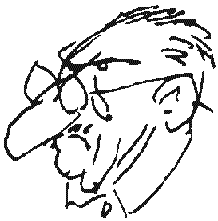 |
Clean air, clean water,
clean environment. We think of those things as part of
our birthright. They were long ago, before we overran
them with our brand of civilization. Now, what have we
got? Air so polluted that we have to grind it before it
will filter through our gasmasks. Water so undrinkable
that it is safer to die of thirst. Environment so
littered that we cannot see the ground, and ground so
caustic with chemical spill that it eats through the
soles of our shoes. So we dream that somewhere in the boondocks we can find a place that is still as clean as nature intended? But if we find such a place; would it be safe to move in? Cemeteries and funerals are for the living. When I go out to visit Garé's grave, I can almost feel her presence, but to visualize what's really there - by now a bunch of bones in a coffin - I feel that's none of my business. I think of death as total peace. You're beyond the clutches of all those who would crush you. I have no apprehension, no fear of death. I do not believe in an afterlife. |
| http://www.cbarks.dk/THEQUOTES.htm | Date 2004-08-21 |